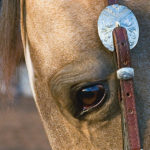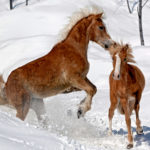Cold weather may still be weeks away, but now’s the time to look ahead and predict how your older horse might fare through the season. Here are the key points to consider:

• His weight. An older horse may have trouble holding his weight during cold weather. If he’s on the thin side already, now’s the time to up his ration—starting by adding forage first —to ensure he goes into winter in a healthy condition.
• His teeth. Digesting forage helps a horse stay warm during the winter months, but an older horse who can’t sufficiently chew hay won’t get that benefit and may be more prone to choke. If he hasn’t had one recently, schedule a dental checkup for your horse to address any issues now.
• His parasite burden. A fecal egg count before winter arrives is a good idea to check that your deworming program worked well through the summer. In cold climates, parasites are not active over the winter months, so you will likely be able to take a break from monitoring or treatment. In milder climates, however, you’ll want to stay vigilant against parasites throughout the season. Your veterinarian can help you devise a plan based on your horse’s needs and environment.
• His mobility. Colder weather can make sore, arthritic0 joints that much more achy. An older horse might move slowly or even have trouble rising during the cold months. If your horse has a history of arthritis and isn’t on a joint supplement already, now might be the time to start him on one. If you think he needs more help staying mobile, talk to your veterinarian about trying injections of hyaluronic0 acid or polysulfated0 glycosaminoglycans in troublesome joints.
• His hooves. Winter is not the ideal time to address serious hoof issues. Not only do hooves grow more slowly in the colder months—meaning it will take longer to make any adjustments in their shape or angle—but frozen footing, mud, ice and snow present extra challenges to hoof health. Have a chat with your farrier about what you can do now to send your horse into winter on solid, healthy hooves.
This article first appeared in EQUUS issue #444.
Cold weather may still be weeks away, but now’s the time to look ahead and predict how your older horse might fare through the season. Here are the key points to consider:
• His weight. An older horse may have trouble holding his weight during cold weather. If he’s on the thin side already, now’s the time to up his ration—starting by adding forage first —to ensure he goes into winter in a healthy condition.
• His teeth. Digesting forage helps a horse stay warm during the winter months, but an older horse who can’t sufficiently chew hay won’t get that benefit and may be more prone to choke. If he hasn’t had one recently, schedule a dental checkup for your horse to address any issues now.
• His parasite burden. A fecal egg count before winter arrives is a good idea to check that your deworming program worked well through the summer. In cold climates, parasites are not active over the winter months, so you will likely be able to take a break from monitoring or treatment. In milder climates, however, you’ll want to stay vigilant against parasites throughout the season. Your veterinarian can help you devise a plan based on your horse’s needs and environment.
• His mobility. Colder weather can make sore, arthritic0 joints that much more achy. An older horse might move slowly or even have trouble rising during the cold months. If your horse has a history of arthritis and isn’t on a joint supplement already, now might be the time to start him on one. If you think he needs more help staying mobile, talk to your veterinarian about trying injections of hyaluronic0 acid or polysulfated0 glycosaminoglycans in troublesome joints.
• His hooves. Winter is not the ideal time to address serious hoof issues. Not only do hooves grow more slowly in the colder months—meaning it will take longer to make any adjustments in their shape or angle—but frozen footing, mud, ice and snow present extra challenges to hoof health. Have a chat with your farrier about what you can do now to send your horse into winter on solid, healthy hooves.
This article first appeared in EQUUS issue #444.





